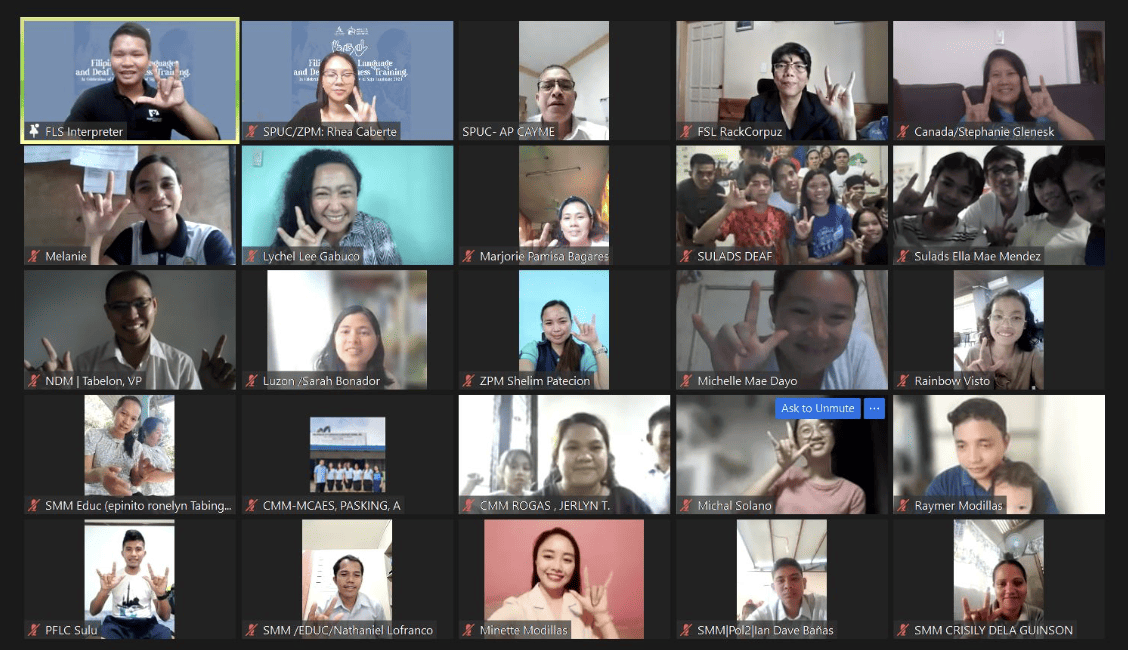
In response to the International Day of Sign Language on September 23, Adventist Possibility Ministries (APM) in Pagadian, the capital of Zamboanga del Sur province in the Philippines, launched the “Giving New Smiles and New Hope” program. It aims to improve the life of the Deaf people by promoting sign language skills and Deaf awareness among the Filipino community.
This transformative video conference–mediated endeavor united participants from diverse backgrounds on September 25. It provided attendees with an opportunity to learn sign language intricacies and deepen their understanding of the Deaf community.
Jewey Serrano, church pastor in Pagadian, played a pivotal role in motivating the local community to actively engage in this initiative. Adventist laypeople also came together to support the Deaf ministry of the South Philippine Union Conference (SPUC) Adventist Possibility Ministries department.
“Every individual deserves the opportunity to embrace hope and witness God’s guidance and intervention in their lives,” Serrano emphasized. “The Deaf community holds a special place in God’s heart, and He listens to the voice of their hearts. It is our responsibility to facilitate their connection with God and provide them with a meaningful spiritual experience.”
Miriam Acosta-Llanos, the president of the Provincial Persons with Disability Affairs Office (PDAO) in the Philippines, was a key figure in this collaboration. Her leadership and dedication were instrumental in making this program a reality.
Acosta-Llanos expressed her heartfelt appreciation, stating, “The Adventist Church’s deliberate efforts to reach out to our Deaf communities resonate deeply with me. Working in collaboration with the Adventist Church brings us immense joy as we share hope and smiles with individuals who are often overlooked.”
This unique initiative aimed to raise funds and awareness through a series of training sessions, where participants, for a mere 100 Philippine pesos (about US$1.75), contributed to a worthy cause while gaining valuable insights into Filipino Sign Language. These sessions were conducted by passionate Deaf leaders and advocates committed to sharing the rich culture, identity, and language of the Deaf community. Participants received certificates upon successfully completing the training, acknowledging their commitment to promoting belongingness and understanding.
This event provided a unique opportunity for individuals to directly impact the lives of their Deaf friends and fellow community members within the SPUC, contributing to a cause with the power to create lasting change.
Recent reports from the National Council on Disability Affairs (NCDA) highlighted the pressing need for initiatives like APM’s program. According to the NCDA, nearly 50 percent of the more than 1,700 local government units in the Philippines lacked an office or point person dedicated to addressing the needs of persons with disabilities (PWDs). This underscored the urgency and significance of programs bridging these gaps.
Acosta-Llanos emphasized the crucial role played by the PDAO in reaching out to PWDs who may have difficulty accessing government programs and services. With at least 1.44 million PWDs in the country, as reported by the Philippine Statistics Authority's 2010 Census of Population and Housing, the need for such initiatives could not be overstated.
“Giving New Smiles and New Hope” was not merely a program; it embodied the power of compassion and the unyielding spirit of the church community, leaders behind the initiative explained. “It offered individuals a tangible way to make a positive difference in the lives of PWDs, exemplifying the core principles of Adventist Possibility Ministries. As individuals came together to support this initiative, they embarked on a journey promising new smiles and renewed hope for those in need,” they said.
The original version of this story was posted on the Southern Asia-Pacific Division news site.